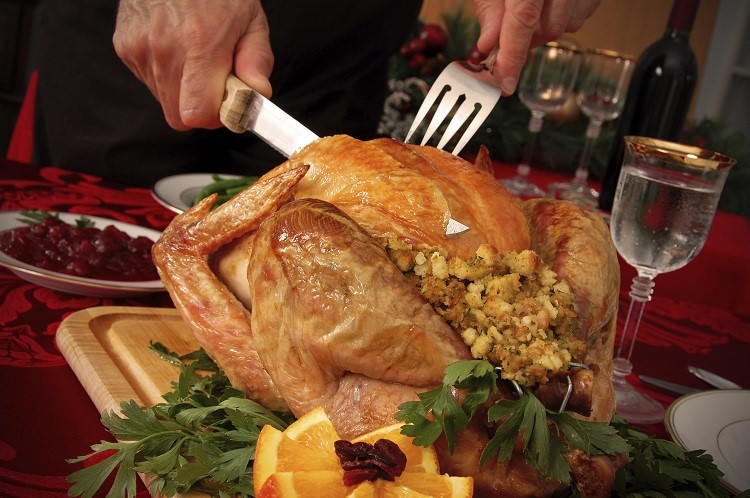Food is one of the most highly anticipated parts of the holiday season. From turkey and rich side dishes to pumpkin- and peppermint-packed desserts, nothing says celebration like family and friends gathered around a dinner table full of food.
Unfortunately, some of the season’s culinary delights can be problematic or entirely off-limits for people with chronic health conditions and digestive issues. Katherine Downes, RD, CDN, CDE, a clinical dietician at St. Luke’s Cornwall Hospital in Newburgh, New York, says that people with dietary restrictions can still enjoy delicious, healthy meals during the holidays. She offers the following advice for keeping feasts flavorful despite diet-sensitive health issues.
- Arthritis
Minimizing inflammation is the primary objective for people with arthritis and joint pain, and diet plays a huge role in regulating inflammatory reactions in the body. There are countless ingredients rumored to be beneficial for people suffering from arthritis pain, but Downes suggests consuming those high in omega-3 fatty acids (for reducing inflammation) as well as vitamin D and calcium, which, when consumed together, may reduce pain and improve bone and joint health. To cover all three bases in one meal, she recommends noshing on baked salmon marinated in a cranberry glaze with a side dish of broccoli sprinkled with low-fat cheese. - Diabetes
Big feasts are synonymous with the holiday season, but if you have diabetes, overindulgence is inadvisable, says Downes. To prevent dangerous fluctuations in blood sugar, try to eat regular snacks throughout the day rather than binging on big meals.
When it’s time to sit down to dinner, load up on lean protein, like roasted chicken or turkey breast or pork or beef loin, and healthy carbohydrates, like vegetables, whole grains and legumes. Limit starchy foods and those made with processed grains. For example, opt for a baked sweet potato instead of a white potato and a whole wheat roll instead of bread made with white flour.
Filling up on delicious, low-carb options during the main course will allow you to indulge a little when it’s time for dessert. For a sweet dish that won’t spike your sugar levels, try cinnamon-spiced quinoa with baked butternut squash and almonds. There are also plenty of recipes available online for diabetic-friendly versions of traditional holiday desserts that are lower in sugar and carbs. - High Blood Pressure
Keeping high blood pressure at bay is all about keeping your sodium intake to a minimum. This can be a daunting task during holiday meals featuring salty soups, holiday ham and brined birds. The goal is to keep daily sodium intake at or below 2,300 milligrams, according to Downes. Slashing salt from your diet doesn’t mean you have to resign yourself to a tasteless holiday meal, however. You can still flavor your dishes with herbs and spices, aromatic ingredients, like onion, celery, garlic, carrots, and ginger, and other salt-free seasonings. Cooking from scratch can have a significant impact on how much sodium goes into your holiday meal, because you have complete control over all the ingredients. Simply adding a salt shaker to the dinner table allows guests the freedom to alter their food to meet their individual tastes and health conditions (or lack there-of). - Irritable Bowel Syndrome (IBS)
There is one guest that is never welcome at a holiday gathering: gas. For the sake of everyone at the dinner table, IBS sufferers should carefully consider the side dishes they choose and avoid traditional culprits, such as broccoli, Brussels sprouts, cabbage, cauliflower and beans. For keeping diarrhea and constipation in check, Downes advises sticking to smaller portions of sugary, caffeinated or alcoholic food and beverages and opting for whole grains, fruits, vegetables and other sources of fiber. Large meals and stress are often synonymous with the holidays, but these factors can also cause symptoms of IBS to worsen. Try your best to stick to moderate serving sizes and avoid unnecessary stressors to keep your digestion in check and fully enjoy holiday celebrations. - Acid Reflux
If you suffer from acid reflux, moderation is the key to having a merry meal. This principal applies to both food and alcoholic drinks—overindulging in either can lead to holiday heartburn. Keeping nausea at bay also means shying away from some favorites, such as peppermint lattes and chocolate bark. Along with citrus and tomatoes, mint and chocolate are notorious instigators of acid reflux.
Resist the urge to lie down after a big meal, too. Reclining can make heartburn symptoms worse. Instead, gather up your loved ones and go for a leisurely walk to help your food digest. If you are prone heartburn or looking forward to a particularly rich dish that you know is bound to give you trouble, do yourself a favor and pop an over-the-counter antacid or acid-blocker before you sit down to eat.
Remember that communication about these matters is the best policy. If you are hosting a get-together, be sure to ask your guests if they have any dietary restrictions. The same applies if you will be attending a holiday dinner or gathering. Let the host know in advance if you or your loved one has special dietary needs, and offer to bring a compliant dish. If there aren’t any surprises, then everyone is bound to enjoy a delicious and healthy holiday celebration.
